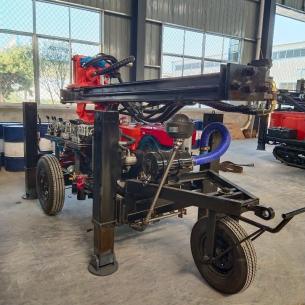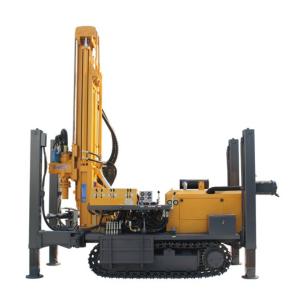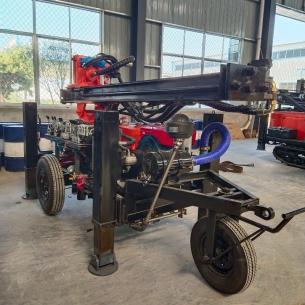Air Compressor: Drilling Rig Manufacturers Explain Its Core Role In Drilling
When people ask, "What does an air compressor do?" you might think of inflating tires or powering pneumatic tools. But in water well drilling, the air compressor is much more than that—it's the "lungs" of the entire drilling system and the key to efficient and clean well completion. As a professional water well drilling rig manufacturer, we'll provide an in-depth understanding of the air compressor's essential role in drilling operations.
The Core Function of Air Compressors in Drilling Operations
For water well drilling rigs, air compressors play two primary roles: providing power and enabling circulation.
1. Providing Drilling Power
This is the most direct function of an air compressor. In pneumatic drilling rigs (such as down-the-hole hammer drills), the high-pressure air generated by the air compressor directly drives the down-the-hole hammer (DTH hammer) at the bottom of the well. The DTH hammer's piston strikes at an extremely high frequency, breaking the rock. This method is particularly suitable for hard rock formations, achieving extremely high drilling efficiency.
2. Circulating Air to Clean the Wellbore
This is a crucial and versatile use of air compressors during drilling.
Cuttings Removal: During drilling, the drill bit continuously generates a large amount of rock fragments (called "cuttings"). An air compressor injects high-pressure air into the wellbore through the center of the drill pipe or the annulus of double-walled drill pipe. This air carries the cuttings along the wellbore and then rapidly returns to the surface through the annular space between the drill pipe and the wellbore wall. This process, known as "air reverse circulation," keeps the wellbore clean, ensuring the drill bit always contacts fresh rock, thereby maintaining an efficient drilling rate.
Cooling the Drill Bit: The high-speed friction between the drill bit and the rock generates a significant amount of heat. Continuous air flow effectively cools the drill bit, preventing damage from overheating and significantly extending its service life.
3. Assisting with Tubing Running and Well Completion
After drilling is complete, air compressors continue to play an important role.
Wellbore Drying and Cleaning: Before running the wellbore casing and filter pipe, air can be injected into the wellbore to dry and thoroughly clean the wellbore wall, ensuring smooth subsequent work.
Well Flushing and Agitation: After well completion, using an air compressor for air lift flushing is a common and effective method. By intermittently injecting high-pressure air into the wellbore, the water is strongly agitated, completely dislodging fine mud and rock debris that have seeped into the aquifer during drilling, thereby unblocking the aquifer and significantly increasing the well's water yield.
4. Providing Auxiliary Power
At the drilling site, many auxiliary equipment relies on compressed air, such as:
Pneumatic wrenches (for unscrewing and removing drill pipe)
Wellhead dust removal devices (such as dust hoods, for environmentally friendly construction)
Other pneumatic tools
How to choose the right air compressor for your drilling rig?
Choosing the right air compressor is just as important as choosing the drilling rig itself. As a drilling rig manufacturer, we provide professional matching advice to our customers, focusing on two key parameters:
Air volume (CFM or m³/min)
This refers to the volume of air produced per minute by the air compressor. Insufficient air volume prevents the effective removal of cuttings from the wellbore, leading to serious accidents such as re-grinding, stuck drill bit, and even drill bit burial. The required air volume depends on the wellbore diameter, depth, and geological conditions.
Pressure (PSI or Bar)
This refers to the pressure of the air. Sufficient pressure is required to overcome the static pressure of the water column in the wellbore, ensuring that the air reaches the wellbore and works effectively. The deeper the well, the higher the pressure requirement.
Our advice: Be sure to select the right air compressor for your drilling rig model, target well depth, and expected formation. A powerful, well-matched air compressor is fundamental to a successful, efficient, and safe drilling project.
Conclusion
In short, the air compressor is not just a standalone tool in water well drilling. Rather, it functions as the "power heart" and "cleaning guardian" of the drilling rig, working closely with it. It operates throughout the entire process, from spitting, drilling, to well cleaning and completion, and directly determines drilling efficiency, cost, and safety.
Are you looking for a high-performance air compressor solution that's the perfect match for your drilling rig?
As a professional water well drilling rig manufacturer, Wogong not only provides high-quality drilling rigs but also offers comprehensive technical solutions, including air compressor selection. Contact us for professional equipment configuration recommendations and quotes to ensure your drilling projects are more efficient!



